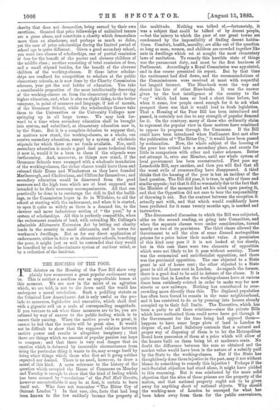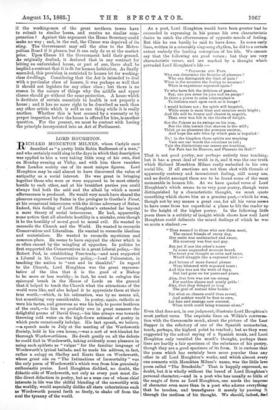THE HOUSING OF THE POOR. T HE debates on the Housing
of the Poor Bill show very plainly how evanescent a great popular excitement may be. This is neither a needless nor an unprofitable lesson at this moment. We are now in the midst of an agitation which, we are told, is not to die down until the world has undergone a moral revolution. Such a peddling statute as the Criminal Law Amendment Act is only useful as the pre- lude to measures, legislative and executive, which shall deal with a gigantic evil on a scale of corresponding magnitude. If you venture to ask what these measures are to be, you are referred by way of answer to the public feeling which is to ensure their passing. When the motive power is so great, it cannot be but that the results will be great also. It would not be difficult to show that the supposed relation between motive power and results is altogether imaginary ; that there are things which no amount of popular passion can hope to compass ; and that there is very real danger that an emotion which is debarred by inexorable circumstances from doing the particular thing it wants to do, may avenge itself by doing other things which those who first set it going neither expected nor desired. There is no need, however, to draw a moral of this kind. A mere reference to the history of the question which occupied the House of Commons on Monday and Tuesday is enough to show that the kind of feeling which has been aroused by " revelations " of the Pall Mall Gazette, however uncontrollable it may be at first, is certain to burn itself out. Who does not remember " The Bitter Cry of Outcast London "? In that case, also, facts that had long been known to the few suddenly became the property of the multitude. Nothing was talked of,—fortunately, it was a subject that coald be talked of by decent people, —but the misery to which the poor of our great towns are condemned by the impossibility of finding decent habita- tions. Comfort, health, morality, are alike out of the question so long as men, women, and children are crowded together like ants in dwellings which set at nought the most elementary laws of sanitation. To remedy this horrible state of things was the paramount duty, and must be the first business of Parliament. Accordingly a Royal Commission was appointed, and in due course presented its report. But by that time the excitement had died down, and the recommendations of the Commissioners were received at most with respectful but languid interest. The Blue-book went the way and shared the fate of other Blue-books. It was the answer given by the best intelligence of the country to the " cry " which had been so loud a short time before, but when it came, few people cared enough for it to ask what prospect there was that it would lead to fresh legislation. That a Housing of the Poor Bill has been introduced and passed, is certainly not due to any strength of popular demand for it. On the contrary, many of those who ordinarily claim to represent the popular view in these matters have combined to oppose its progress through the Commons. If the Bill could have been introduced when Parliament first met after the publication of "The Bitter Cry," it would have been passed by acclamation. Now, the whole subject of the housing of the poor has retired into a secondary place, and counts for little in comparison with other and vaster schemes. Better not attempt it, cries one Member, until our whole system of local government has been reconstructed. First pass my Leaseholds Bill, says another, and then you will find that all the worst evils of overcrowding have disappeared. A third thinks that the housing of the poor is but an incident of the land question. The Bill did pass, it is true, in spite of these and similar appeals ; but that it did so was mainly due to the fact that the Minister of the moment had set his mind upon passing it, and that the Opposition did not care to bear the responsibility of throwing it out. But the contrast between the reception it actually met with, and that which would confidently have been predicted for it some twenty months ago, is marked and instructive.
The disconnected discussion to which the Bill was subjected, alike on the second reading, on going into Committee, and when the separate clauses were under consideration, turned mostly on two of its provisions. The third clause allowed the Government to sell the sites of some disused metropolitan prisons for a price below their market value. A permission of this kind may pass if it is not looked at too closely, but in this case there were two elements of opposition which were not likely to let it pass without scrutiny. There was the economical and anti-Socialist opposition, and there was the provincial opposition. The one objected to a State grant in aid of house rent ; the other objected, to a State grant in aid of house rent in London. As regards the former, there is a good deal to be said in defence of the clause. It is quite true that in London the working-classes have at various times been ruthlessly evicted in order to make way for new streets or new railways. Nothing has contributed to over- crowding more directly than this. The displaced population has often been forced to remain in the same neighbourhood, and it has contrived to do so by pressing into houses already occupied up to their full limits. The Executive, which has been a party to all these evictions—since the private Bills which have authorised them could never have got through if the Government for the time being had opposed them— happens to have some large plots of land in London to dispose of, and Lord Salisbury contends that a natural and proper way of disposing of them is to let the Metropolitan Board have possession of them at a price which will allow of the houses built on them being let at moderate rents. No doubt the difference between the sum so obtained and the market value would have been in the nature of a subsidy paid by the State to the working-classes. But if the State has thoughtlessly done them injustice in the past, may it not without blame do something to remedy this injustice ? Perhaps if the anti-Socialist objection had stood alone, it might have yielded to this reasoning. But it was reinforced by the more solid objection that the sites of these prisons are the property of the nation, and that national property ought not to be given away for anything short of national objects. Why should the working-men of London be recouped for what has been taken away from them for the public convenience, if the working-men of the great northern towns have to submit to similar losses, and receive no similar com- pensation Against this argument the Home Secretary could make no way ; and, in the end, the Clause was deprived of its sting. The Government may sell the sites to the Metro- politan Board if it pleases, but it can only do so at the market price. Upon Clause 13 the Government held their ground. As originally drafted, it declared that in any contract for letting an unfurnished house, or part of one, there shall be implied a contract that it is fit for human habitation. As finally amended, this provision is restricted to houses let for working- class dwellings. Considering that the Act is intended to deal with a particular class of houses, it was perhaps as well that it should not legislate for any other class ; but there is no reason in the nature of things why the middle and upper classes should go without the same protection. A house which is destitute of certain essentials to health is not properly a house ; and it has no more right to be described as such than any other article which is sold as one thing while it is really another. Whether this is best secured by a warranty or by proper inspection before the house is offered for hire, is another question. For the present, we must be content with having the principle incorporated into an Act of Parliament.



































 Previous page
Previous page